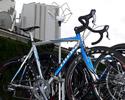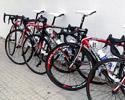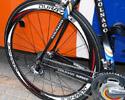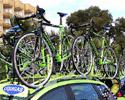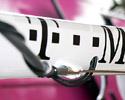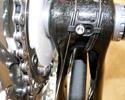
Recently on Cyclingnews.com |
Race Tech: Challenge Volta a Mallorca, February 13, 2007
New wheel goodies from Shimano and other tech tidbits
By James Huang in Mallorca, Spain
Although usually a fairly relaxed traditional early season stage race, this year's Challenge Volta a Mallorca hosted a surprisingly well-stacked field. Eleven ProTour teams appeared on the start list, including Discovery Channel, Rabobank, Astana, Quick-Step Innergetic, Saunier Duval-Prodir, and Gerolsteiner. An incognito stroll through the start village revealed mostly the usual cast of standard framesets, wheels, and components, but a handful of early-season prototype equipment was also subtly tucked into the mix.
Most notable were significant updates to both of Shimano's carbon fiber wheelsets. Shimano only recently introduced its WH-7801-Carbon and 50mm-deep WH-7801-Carbon50 Dura-Ace models, but the Osaka-based giant has already seen fit to replace the somewhat controversial hub-located nipples with a more traditional configuration on both sets.
Relatively large red-anodized aluminum nipples now rest solely in the rim, and a standard straight-pull spoke head lies at the other end. Overall spoke counts of 20 in the rear and 16 up front remain unchanged for both. Likewise, the lacing pattern has carried over, as well as the star-shaped rear hub flanges, but the new hub shells now wear an edgier look and are also reported to be slightly lighter than last year's versions.
According to one Rabobank team mechanic, the riders find the new wheels to be noticeably stiffer, and the standard nipple placement surely makes the wheels easier to true as well. We didn't spot the new hoops in the Gerolsteiner area (also sponsored by Shimano), but the team had already been running standard Dura-Ace hubs with conventional J-bend spokes and nipples laced to the company's carbon rims for presumably the same reasons.
As previously noted on multiple occasions, power meter usage in the ProTour has steadily grown over the past few years as teams have found the UCI-imposed 6.8kg weight limit increasingly easy to beat (and in some cases, difficult to satisfy). In contrast to lead weights and other forms of 'dead' mass randomly affixed to down tubes and whatnot, power meters can often add the necessary grams as well as provide supremely useful data. Each of the T-Mobile race bikes hit the start line equipped with standard SRM models but with some interesting sensor and wire routing.
SRM's power and cadence sensor can be notoriously difficult to mount on some carbon fiber frames, but T-Mobile and/or Giant have apparently come across a rather novel internal solution. Although it wasn't visible, the sensor is presumably mounted inside the driveside chainstay. The sensor wire is then routed up the seat tube and forward in the top tube, eventually exiting through a pea-sized hole near the forward brake housing stop. Chances are that Giant won't endorse its general consumers to do the same (as it would surely void the warranty), but it's an interesting technique nonetheless.
Photography
For a thumbnail gallery of these images, click here
Images by James Huang/Cyclingnews.com
- Many Shimano-sponsored teams were sporting the updated version of Shimano's Dura-Ace pedal. The wider body offers better support and the metal plate should wear better than the plastic one.
- Don't look for these in your local shop just yet...
- Shimano has updated its 50mm deep carbon fiber Dura-Ace wheels after just one season on the market.
- The new hubs feature a new edgier look and are also reported to be slightly lighter than before.
- Rear hub internals are supposed the same but nipples have moved away from the hub flange and standard straight-pull spokes are used.
- Some of the Rabobank team bikes were spotted with new prototype Dura-Ace carbon wheels.
- The offset rear rim of last year's WH-7801-Carbon has carried over.
- The Dura-Ace WH-7801-Carbon has been significantly updated with new spokes and nipples, hubs, and revised rims.
- Shimano appears to be making red nipples somewhat of a trademark colour on its new crop of wheels.
- SRM wires on T-Mobile's race bikes were routed internally and exited via a small hole in the top tube.
- Look Ma, no sensor! Well, at least it's not visible.
- Astana team mechanics fashioned this clever mount for race numbers. The mount likely also prevents the somewhat touchy clamp arrangement from being overtightened.
- Better safe than sorry. Dropped chains still occur from time to time, even with the precision of modern-day componentry, and a few grams of plastic courtesy of the Third-Eye Chain Watcher adds some much-appreciated insurance.
- The Challenge Volta a Mallorca wasn't televised, but that didn't stop the Discovery Channel team from running a TV antenna atop the team car. According to one member of the team, "sometimes we get bored!"
- Gerolsteiner's riders and/or mechanics apparently aren't too fond of Shimano's hub-located nipples, either, as they have been running standard Dura-Ace hubs on the company's carbon rims since last year.
- A fleet of new Cannondale System Six bikes await atop the Liquigas car.
- This isn't your typical roof rack system.
- One of these things is not like the other... Tom Boonen piloted the only black bike of his Quick-Step Innergetic team (third from left).
- Even Boonen's pedals (in background) were slightly different from those of the rest of the team
- Boonen was riding a carbon fiber FSA SL-K handlebar, which features the company's new shallower drop and shorter reach.
- Some Rabobank bikes ran with seat collars that were rotated such that the slot in the frame and the slot in the clamp were offset by 180 degrees. This was done to prevent crimping of relatively fragile (as compared to aluminum) carbon fiber seatposts.

